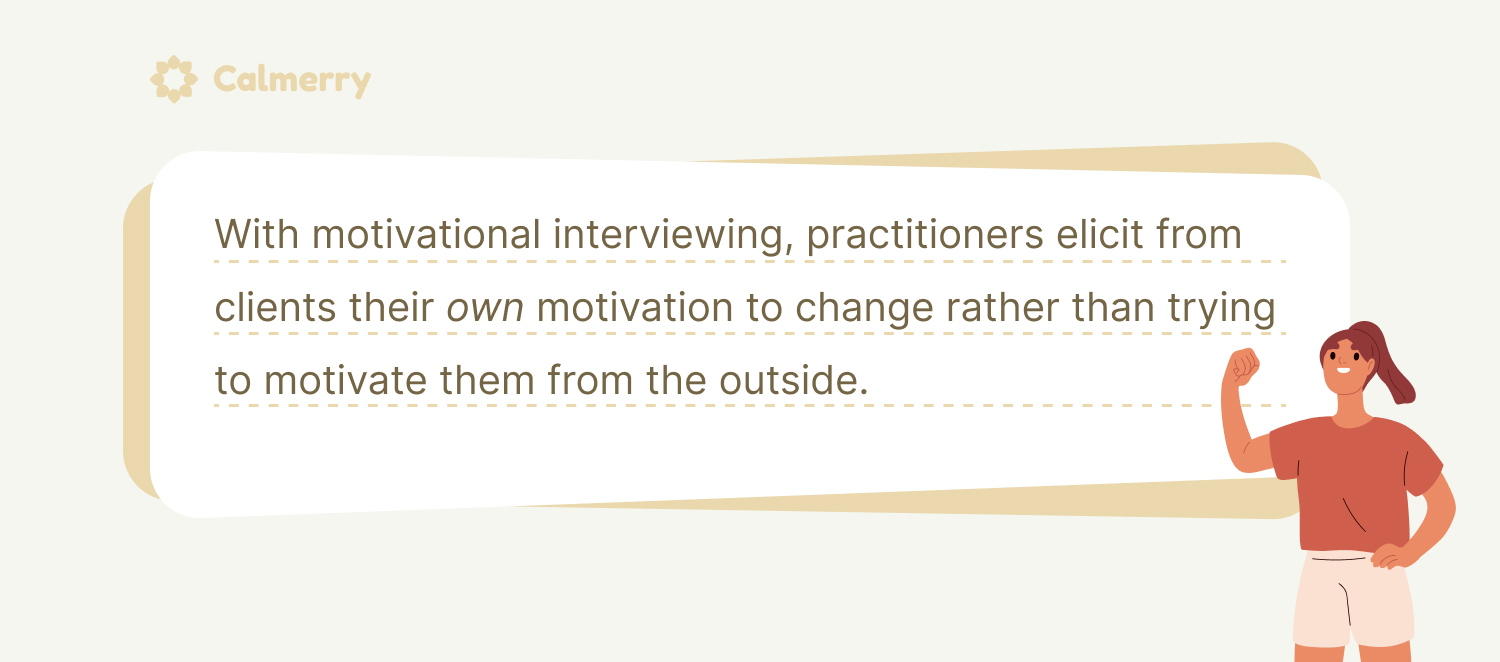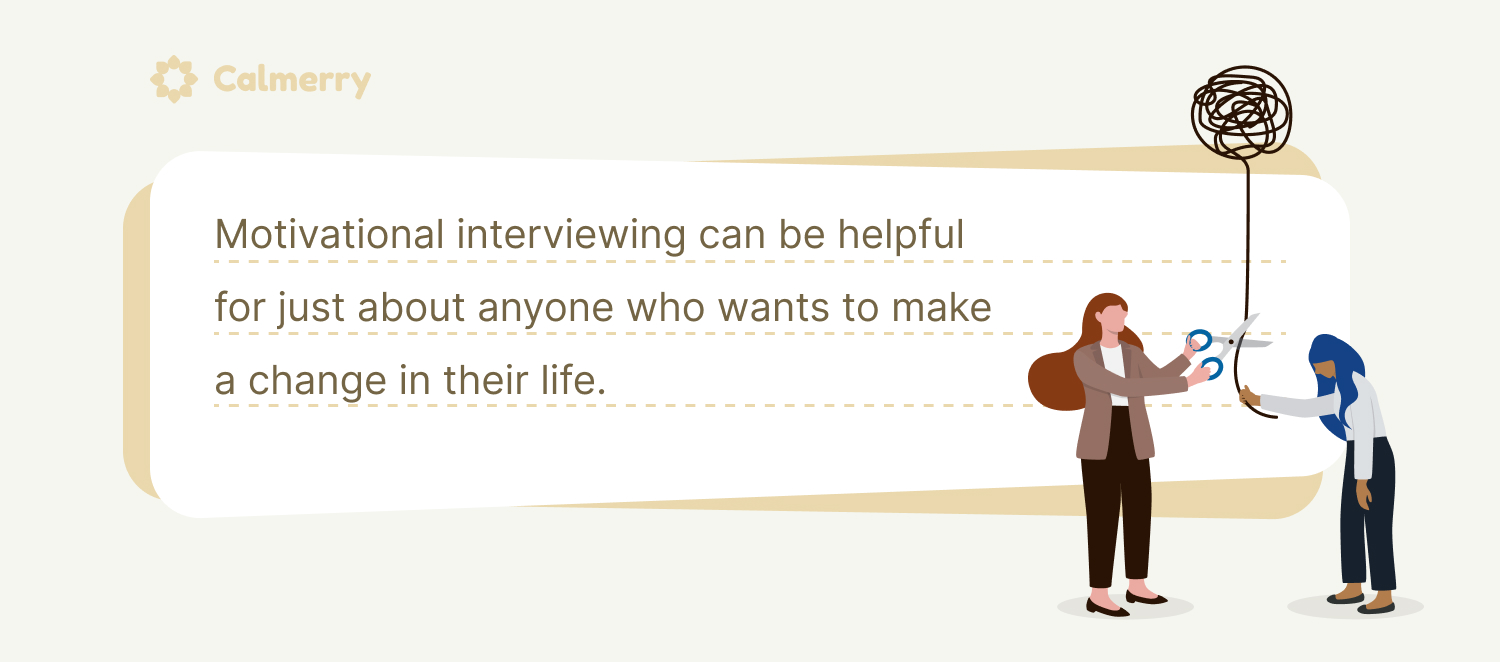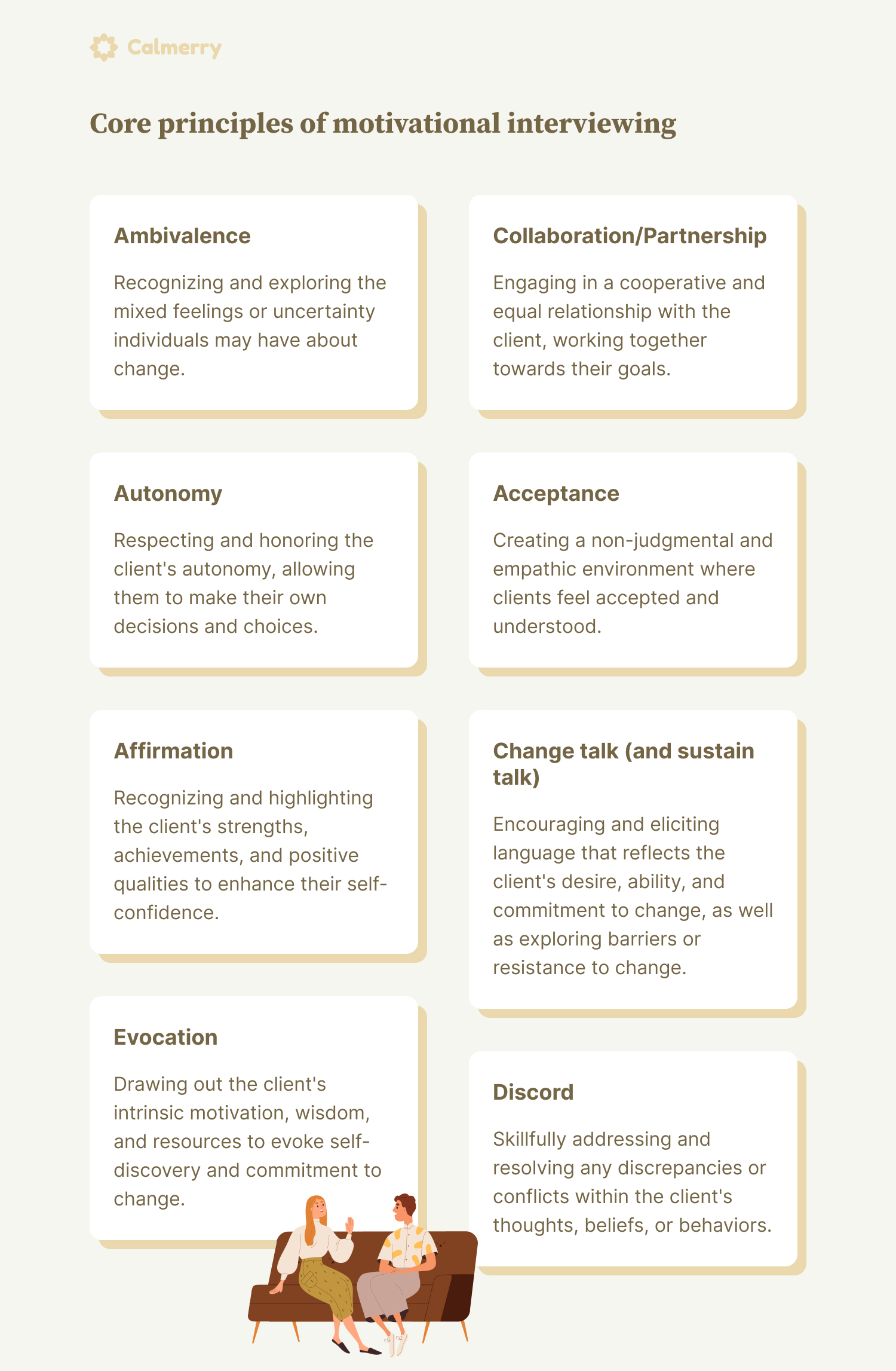Motivational Interviewing: How It Works, Who It Can Help, Techniques, and Benefits

In this article
Imagine a change that you wish you could make in your life – maybe something you’ve been trying to change for a while now, like sticking to a morning routine or starting therapy – but, for whatever reason, you haven’t. You have your reasons – maybe you’ve been too busy, or you’re afraid.
Now, imagine if there was a counseling style that, in just a few sessions, could help you feel more intrinsically motivated to finally make that change. In just a few sessions, you could remember why this change is so important to you and finally just do it.
This is exactly what a framework called motivational interviewing can help you with. If you’re having mixed feelings about making a positive change in your life – you want to do it, but you’re still not 100% sure – then motivational interviewing can help.
Here’s everything you should know about this style of counseling.
What is motivational interviewing (MI)?
Motivational interviewing, commonly known as MI, is a style of counseling or coaching that helps people feel more motivated to make healthy changes in their lives. Dr. Bill Miller, the founder of MI, defines it simply as a “conversation about change.”
With motivational interviewing, practitioners elicit from clients their own motivation to change rather than trying to motivate them from the outside.

Miller originally created MI in the 1970s as a way to help problem drinkers change their habits. While working with this population, he realized that most counselors used an authoritarian style. Counselors believed that they knew what was best for their patients, and that people who were addicted to drugs and/or alcohol weren’t capable of making good decisions for themselves.
In practice, this meant that counselors told their patients they needed to change. They lectured them about how they could make these changes and why they needed to make them.
Miller, realizing that this style wasn’t effective in truly creating change, came up with motivational interviewing.
Using motivational interviewing, he (and generations of MI practitioners that have come after him) empowered his patients to decide for themselves when, how, why, and if to stop drinking. With MI, practitioners elicit from clients their own motivation to change rather than trying to motivate them from the outside. There is a deep understanding that, when it comes to personal behavior change, the only person who can commit to change is the person changing.
MI is not a panacea to solve every problem in life. It’s also not a comprehensive psychotherapy method in and of itself. It’s simply a framework for thinking and talking about behavior change. Many different practitioners use an MI framework in their practice, from mental health therapists to addiction counselors, nurses, dieticians, fitness coaches, and more.
How does motivational interviewing work, and who can it help?
Motivational interviewing practitioners work based on the knowledge that motivation to make a personal change needs to come from you (the person doing the changing), not from them.
Most of us have had the experience of someone telling us what to do. For example, a doctor might have repeatedly told you that you need to exercise more. Your dentist might lecture you about the importance of flossing. Friends and family may have gotten on your case about drinking less.
When someone tells you what to do, how do you typically feel? Most of us tend to feel frustrated and resentful. We might even want to push back against that person.
The thing is that almost all of us know which behaviors are healthy for us. There’s probably a part of you that wants to make a change or feels like you “should” – no matter if the change is quitting drinking, getting up earlier in the morning, or something else – but for some reason, you just can’t get yourself to do it. Does this sound familiar?
This is called ambivalence and lies at the heart of motivational interviewing. Ambivalence is both wanting something and not wanting something at the same time. There are reasons you want to change and reasons you want to stay the same.

Motivational interviewing works by using techniques like open questions and reflections in order to help you move more toward the side of your ambivalence that does want to change. Instead of telling you that you need to change and why, motivational interviewing practitioners ask you the right questions and guide the conversation in a way that helps you reflect on why this change is important to you and what it would mean for your life.
Considering this, motivational interviewing can be helpful for just about anyone who wants to make a change in their life. Although it was originally used for people facing substance use disorder and continues to be commonly used with this population, it can help anyone who has mixed feelings about a behavior change, no matter what that change is.
In other words, regardless of whether you’re considering walking away from a lifetime of addiction or simply want to stick to a healthier routine, motivational interviewing can help.
Core principles of motivational interviewing
Ambivalence is one of the most important principles of motivational interviewing. MI practitioners are intimately familiar with ambivalence and work on helping you identify it and resolve it.
In addition, some other important core principles in motivational interviewing include:
Collaboration/Partnership
In motivational interviewing, your counselor or coach doesn’t take the role of the expert. Instead, they partner with you, and honor that each person is the expert on their own life. You will move through the process as equal partners.
Autonomy
This term describes the irrevocable right for each person to make their own choices. You are the only person who can decide to change (or not). Your motivational interviewing practitioner isn’t able to take this choice away from you, nor will they pretend they are able to.
Acceptance
MI is theoretically influenced by Carl Rogers’ humanistic model of psychotherapy and borrows the concept of unconditional positive regard (known in MI as acceptance). To put it simply, the concept of acceptance means that your counselor honors your inherent value as a human being, no matter your choices or behaviors.
Affirmation
MI counselors strive to always see your strengths, as well as the efforts and intentions you make. They reflect and affirm these strengths back to you so that you are aware of the internal resources that you can count on when going through the hard process of change.
Change talk (and sustain talk)
Change talk is any statement you make that promotes making a change, while sustain talk is its reverse – any statement you make that reflects not wanting to make the change. For example, change talk might sound like: “I know I need to start therapy if I really want to heal from this trauma.” Your MI practitioner will carefully listen for these statements.
Discord
In the latest edition of the MI textbook (written by Miller and his colleague, Stephen Rollnick), the authors describe the concept of discord. They teach that when discord (or conflict) arises in the relationship, both the counselor and the client play a role. Discord often comes up when counselors try to push someone to change rather than evoking the client’s own reasons to change.
Evocation
This concept lies at the core of MI, and it’s the idea of eliciting (from you, the client) motivation to change rather than instilling motivation to change. Your MI practitioner will stay away from giving you any unsolicited advice. Rather, they’ll work to draw out what’s already inside of you – why you feel like you want to or need to change.

Motivational interviewing techniques
Your coach or counselor may use a number of specific MI techniques during their conversation with you. Some of the most important techniques that you might notice include:
Reflections
When your counselor reflects what you say, it shouldn’t merely feel like they’re repeating your words back to you. In MI, reflections are used to uncover the deeper meaning behind what you say.
Your MI practitioner will use reflections to help you focus more on your motivation to change (rather than staying stuck in whatever is holding you back).
Open questions
Your counselor may also use open questions to invite you to think (and talk) about your reasons for change. For example, they might ask you to envision what life might be like if you were successful in making the change.
Do you want ot discover the path to a truly meaningful life? Embrace your journey with the “Strategies for Building a Life Worth Living” guide by Tiffany Lovins, Licensed Mental Health Counselor. Let this empowering ebook guide you toward a life filled with joy, purpose, and self-fulfillment. Download your copy in PDF now.
Affirmations
Just like affirmation is a core concept in MI, it’s also an important technique. MI practitioners not only see your strengths – they reflect them back to you in the form of affirmations.
Developing discrepancy
Part of what an MI practitioner may do to help you make healthy changes is to make apparent the gap between what you truly value and how you’re living your life now. This is called developing discrepancy.
For example, you might say that you value living life to the fullest but also be putting your life at risk by using dangerous drugs.
This isn’t an exhaustive list of every motivational interviewing technique that your counselor will use – but it may give you a good idea of what to expect.
Is motivational interviewing effective? What the research says
There is a large body of research that suggests that motivational interviewing is very helpful for a wide range of different people and issues. There are more than 1300 randomized trials (and 150 clinical reviews) that have been conducted on the effectiveness of motivational interviewing.
These studies have found that motivational interviewing can effectively be used for:
- Substance use disorder and addiction
- Smoking cessation
- Weight management
- Diabetes management
- Chronic pain management
- Blood pressure and stroke management
- Child abuse and endangerment
- Medication and treatment adherence
- Increasing physical activity and exercise
- Dental hygiene
- Decreasing high-risk behaviors
- Gambling addiction
- Dual diagnosis (substance use disorder and a mental health condition like depression)
In addition, research has found that when motivational interviewing is paired with a mental health treatment like cognitive-behavioral therapy, it makes the mental health treatment more effective.
What to expect in the first session
Again, remember that motivational interviewing is not a comprehensive psychotherapy model in and of itself. And it’s often used before or in conjunction with another therapy method like dialectical behavior therapy.
So it’s likely that motivational interviewing will be woven through the time you spend with your counselor or therapist. There may not be a formal introduction session to motivational interviewing.
In general, however, MI can be thought of as having 4 nonlinear but related stages. These stages are:
- Engagement
- Focusing
- Evoking
- And planning
Generally, in the first session you have with your MI practitioner, you will be in engagement – or building a trusting therapeutic relationship. Your counselor may emphasize your autonomy in this process and remind you that you are equal partners in this journey.
Some people feel surprised when first going through motivational interviewing because they have become used to medical professionals telling them what to do. A motivational interviewing practitioner will never give you unsolicited advice, which can take some time to get used to.
There is also a treatment method called Motivational Enhancement Therapy (MET), which is a more structured counseling model that’s based on Motivational Interviewing principles. If you’re receiving MET, then the first session will be an assessment session in which you and your counselor talk about how the MI process works and what will be expected of both of you.
Are you ready to get started?
Calmerry has licensed therapists on our team who are trained in motivational interviewing. Although we don’t yet work with people who are primarily facing substance use or physical health issue, motivational interviewing can help with so many other changes that are positive for your mental health.
Create an account today to get started with flexible and accessible online therapy with a qualified therapist, starting at just $50 a week.
online therapy
live video session



